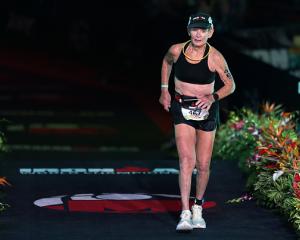
"It was a target we set four years ago and we are still optimistic of achieving that," Sparc chief executive Peter Miskimmin told the Otago Daily Times when he was in Dunedin with the Sparc roadshow this week.
Miskimmin said 2011 was a critical year.
"History has shown that unless you are in the top five of a world event 12 months out from an Olympic Games it is difficult to win a medal.
"We want athletes to step up this year as they attempt to qualify. We will be measuring how many are in the top three to five and in the top eight."
A total of $55 million has been allocated to all high performance sports this year and it goes up again next year.
There has been a $10 million increase of government funding for high performance sport this year. Next year it will be $15 million, and it will jump to $20 million in 2013.
Miskimmin said Olympic medals gave New Zealanders a positive feeling about themselves.
"Any success on the international stage makes New Zealanders feel proud," Miskimmin said.
Over the last few years, rowing and swimming have had their high performance athletes training together at a centralised venue for each sport. Rowing has been at Lake Karapiro and swimming at the Millennium Institute in Auckland.
The medal haul by rowers during the last few years proves that the system is working in that sport. The rowers have maintained their local connection, with rowers such as Hamish Bond and Lucy Strack registered with North End and competing for that club at the national championships.
Swimmers such as Otago's Andrew McMillan, who has joined the elite squad at the Millennium Institute, have severed their local connections and competed for the North Shore club at national championships.
The international performances of the swimmers has been disappointing, despite the high performance funding being given to swimmers training at the Millennium Institute.
"You have to look at it sport by sport to decide where the athletes need to be," Miskimmin said.
"If they can get the coaching and the sports medicine and sports science services they need they should be able to stay anywhere.
"The great Duncan Laing was able to coach Danyon Loader to gold medals at Moana Pool in Dunedin."
Sparc is now reviewing Swimming New Zealand's high performance programme.
Miskimmin said there is no central base for athletics, with the elite having their own programme. Nick Willis and Kimberley Smith are training overseas.
The key high performance goal of Sparc in its strategy plan to 2015 is to win more events on the world stage.
It is working with seven sports to work out a cohesive plan from grass roots to high performance. The sports are rugby, cricket, netball, gymnastics, football, hockey and rugby league.
"Some sports organisations still have the same organisational structure they have used for the last 50 years," Miskimmin said.
"There has been more innovation in game techniques and rule changes."












